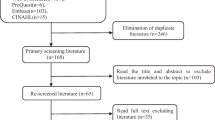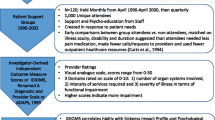Abstract
Background
The NIH-sponsored Patient-Reported Outcomes Measurement Information System (PROMIS) Gastrointestinal (GI) Symptoms scales were developed to assess patients’ GI symptoms in clinical settings.
Aims
To assess responsiveness to change and provide minimally important difference (MID) estimates for the PROMIS GI Symptoms scales.
Methods
A sample of 256 GI outpatients self-administered the eight PROMIS GI Symptoms scales (gastroesophageal reflux, disrupted swallowing, diarrhea, bowel incontinence/soilage, nausea and vomiting, constipation, belly pain, and gas/bloating/flatulence) at two visits. Patient self-reported and physician-reported assessments of the subjects’ overall GI condition were employed as change anchors. In addition, we prospectively assessed change at both visits using a GI-symptom anchor, the Gastrointestinal Symptom Rating Scale (GSRS). Responsiveness to change was assessed using F-statistics. The minimally changed group was those somewhat better or somewhat worse on the retrospective anchors and changing by one category on the modified GSRS (e.g., from slight to mild discomfort to moderate to moderately severe discomfort).
Results
Responsiveness to change was statistically significant for 6 of 8 PROMIS scales using the self-report GI anchor, 3 of 8 scales using the physician-reported anchor, and 5 of 5 scales using the corresponding GSRS scales as anchors. The MID estimates for scales for improvement and worsening were about 0.5–0.6 SD using the GSRS anchor and generally larger in magnitude than the change for the “about the same” group.
Conclusions
The responsiveness and MID estimates provided here for the PROMIS GI Symptoms scales can aid in scale score interpretation in clinical trials and observational studies.
Similar content being viewed by others
References
Everhart JE, Ruhl CE. Burden of digestive diseases in the United States part I: overall and upper gastrointestinal diseases. Gastroenterology. 2009;136:376–386.
Lackner JM, Quigley BM, Blanchard EB. Depression and abdominal pain in IBS patients: the mediating role of catastrophizing. Psychosom Med. 2004;66:435–441.
Seres G, Kovacs Z, Kovacs A, et al. Different associations of health related quality of life with pain, psychological distress and coping strategies in patients with irritable bowel syndrome and inflammatory bowel disorder. J Clin Psychol Med Settings. 2008;15:287–295.
Spiegel B, Strickland A, Naliboff BD, Mayer EA, Chang L. Predictors of patient-assessed illness severity in irritable bowel syndrome. Am J Gastroenterol. 2008;103:2536–2543.
Khanna P, Agarwal N, Khanna D, et al. Development of an online library of patient-reported outcome measures in gastroenterology: the GI-PRO database. Am J Gastroenterol. 2014;109:234–248.
Spiegel BM, Hays RD, Bolus R, et al. Development of the NIH Patient-Reported Outcomes Measurement Information System (PROMIS) gastrointestinal symptom scales. Am J Gastroenterol. 2014;109:1804–1814.
Cella D, Yount S, Rothrock N, et al. The Patient-Reported Outcomes Measurement Information System (PROMIS): progress of an NIH Roadmap cooperative group during its first two years. Med Care. 2007;45:S3–S11.
De Walt DA, Rothrock N, Yount S, Stone AA, Group PC. Evaluation of item candidates: the PROMIS qualitative item review. Med Care. 2007;45:S12–S21.
Samejima F. Estimation of Latent Ability Using a Response Pattern of Graded Scores (Psychometric Monograph No. 17). Richmond, VA: Psychometric Society. Retrieved from: http://www.psychometrika.org/journal/online/MN17.pdf. 1969.
Khanna D, Furst DE, Maranian P, et al. Minimally important differences of the UCLA Scleroderma Clinical Trial Consortium Gastrointestinal Tract Instrument. J Rheumatol. 2011;38:1920–1924.
Glia A, Lindberg G. Quality of life in patients with different types of functional constipation. Scand J Gastroenterol. 1997;32:1083–1089.
Revicki DA, Wood M, Wiklund I, Crawley J. Reliability and validity of the Gastrointestinal Symptom Rating Scale in patients with gastroesophageal reflux disease. Qual Life Res. 1998;7:75–83.
Hays RD, Bjorner JB, Revicki DA, Spritzer KL, Cella D. Development of physical and mental health summary scores from the Patient-Reported Outcomes Measurement Information System (PROMIS) global items. Qual Life Res. 2009;18:873–880.
Rabin R, de Charro F. EQ-5D: a measure of health status from the EuroQol Group. Ann Med. 2001;33:337–343.
Revicki D, Hays RD, Cella D, Sloan J. Recommended methods for determining responsiveness and minimally important differences for patient-reported outcomes. J Clin Epidemiol. 2008;61:102–109.
Hays RD, Farivar SS, Liu H. Approaches and recommendations for estimating minimally important differences for health-related quality of life measures. COPD. 2005;2:63–67.
Hays RD, Hadorn D. Responsiveness to change: an aspect of validity, not a separate dimension. Qual Life Res. 1992;1:73–75.
Fries JF, Krishnan E, Bruce B. Items, instruments, crosswalks, and PROMIS. J Rheumatol. 2009;36:1093–1095.
Yost KJ, Eton DT, Garcia SF, Cella D. Minimally important differences were estimated for six Patient-Reported Outcomes Measurement Information System-Cancer scales in advanced-stage cancer patients. J Clin Epidemiol. 2011;64:507–516.
Crosby RD, Kolotkin RL, Williams GR. Defining clinically meaningful change in health-related quality of life. J Clin Epidemiol. 2003;56:395–407.
Khanna D, Pope JE, Khanna PP, et al. The minimally important difference for the fatigue visual analog scale in patients with rheumatoid arthritis followed in an academic clinical practice. J Rheumatol. 2008;35:2339–2343.
Acknowledgments
The study was funded by NIH/NIAMS U01 AR057936A, the National Institutes of Health through the NIH Roadmap for Medical Research Grant (AR052177). Dinesh Khanna was also supported by NIAMS K24 AR063120. Puja Khanna was supported by Ruth L. Kirschstein National Research Service Award (NRSA) Institutional Research Training Grant NIAMS 1 T32 AR053463 and ACR Research and Education Foundation Clinical Investigator Fellowship Award 2009_11. Ron D. Hays was also supported by Grants from the National Institute on Aging (P30-AG028748 and P30-AG021684) and the National Cancer Institute (1U2-CCA186878-01). Lin Chang was also supported by NIDDK P50 DK64539.
Financial Disclosures
Dinesh Khanna has served as consultant and/or received Grant support from Actelion, Astra-Zeneca, Bayer, BMS, Corbus, Genentech/Roche, Gilead, GSK, and Sanofi Aventis. Ron D. Hays has served as a consultant to Amgen, Allergan, Pfizer, and the Critical Path Institute. Gil Melmed has served as a consultant for Abbvie, Celgene, Given Imaging, Luitpold Pharmaceuticals, and Jannsen, and has received research support from Pfizer. Lin Chang has served as a consultant to Ironwood, Forest, Prometheus, Salix, Takeda North America, and has received Grant support from Tioga, Salix and Ironwood. Brennan Spiegel has received Grant support from Ironwood, Amgen, Shire Pharmaceuticals, and Theravance Pharmaceuticals, and served as a consultant to Ironwood, Forest, and Takeda North America.
Author information
Authors and Affiliations
Corresponding authors
Ethics declarations
Conflict of interest
All authors declares that they have no conflict of interest to the current research.
Rights and permissions
About this article
Cite this article
Khanna, D., Hays, R.D., Shreiner, A.B. et al. Responsiveness to Change and Minimally Important Differences of the Patient-Reported Outcomes Measurement Information System Gastrointestinal Symptoms Scales. Dig Dis Sci 62, 1186–1192 (2017). https://doi.org/10.1007/s10620-017-4499-9
Received:
Accepted:
Published:
Issue Date:
DOI: https://doi.org/10.1007/s10620-017-4499-9




